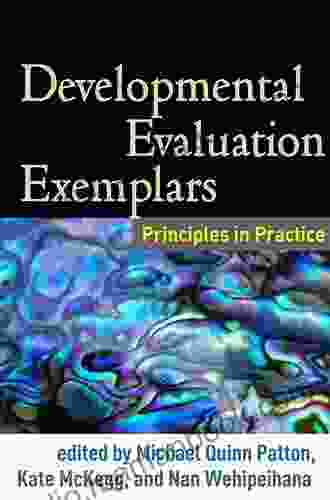Developmental Evaluation Exemplars: Principles in Practice

Developmental evaluation (DE) is an approach to evaluation that is designed to support the development and improvement of complex programs and initiatives. DE is based on the principles of participation, collaboration, and learning. It uses a variety of methods to collect data and provide feedback to stakeholders. DE can be used to evaluate a wide range of programs and initiatives, including those that are focused on social change, community development, and education.
The principles of DE are based on the work of Michael Patton, who is considered to be the father of DE. Patton argues that DE should be:
- Participatory: Stakeholders should be involved in all aspects of the evaluation process, from planning and design to data collection and analysis.
- Collaborative: Evaluators should work with stakeholders to develop a shared understanding of the program or initiative and its goals.
- Learning-oriented: The focus of DE should be on learning and improvement, rather than on judgment or accountability.
- Adaptive: DE should be flexible and responsive to the changing needs of the program or initiative.
- Holistic: DE should take into account the context in which the program or initiative is operating.
DE uses a variety of methods to collect data and provide feedback to stakeholders. These methods include:
4.1 out of 5
| Language | : | English |
| File size | : | 3563 KB |
| Text-to-Speech | : | Enabled |
| Screen Reader | : | Supported |
| Enhanced typesetting | : | Enabled |
| Word Wise | : | Enabled |
| Print length | : | 19 pages |
- Interviews: Interviews can be used to collect data from stakeholders about their experiences with the program or initiative.
- Focus groups: Focus groups can be used to gather data from a group of stakeholders about their shared experiences.
- Surveys: Surveys can be used to collect data from a large number of stakeholders about their attitudes and beliefs.
- Observation: Observation can be used to collect data about the program or initiative in action.
- Document review: Document review can be used to collect data from existing documents, such as program plans, meeting minutes, and reports.
DE can provide a number of benefits to programs and initiatives, including:
- Improved program design and implementation: DE can help to identify areas where the program or initiative can be improved.
- Increased stakeholder involvement: DE can help to build trust and relationships between stakeholders and evaluators.
- Enhanced learning and reflection: DE can help stakeholders to learn about the program or initiative and its impact.
- Increased accountability: DE can help to ensure that the program or initiative is meeting its goals and objectives.
There are a number of exemplars of DE in practice. These exemplars demonstrate how DE can be used to evaluate a wide range of programs and initiatives.
One example of DE in practice is the evaluation of the Boston Public Schools' Turnaround Plan. The Turnaround Plan was a comprehensive plan to improve the performance of the city's lowest-performing schools. The evaluation of the Turnaround Plan used a variety of methods, including interviews, focus groups, and surveys. The evaluation found that the Turnaround Plan had a positive impact on student achievement and school climate.
Another example of DE in practice is the evaluation of the San Francisco Department of Public Health's Health Improvement Partnership (HIP). HIP is a community-based initiative that aims to improve the health of San Francisco residents. The evaluation of HIP used a variety of methods, including interviews, focus groups, and surveys. The evaluation found that HIP had a positive impact on the health of San Francisco residents.
These are just two examples of how DE can be used to evaluate a wide range of programs and initiatives. DE is a powerful tool that can help to improve the design, implementation, and impact of programs and initiatives.
DE is an approach to evaluation that is designed to support the development and improvement of complex programs and initiatives. DE is based on the principles of participation, collaboration, and learning. It uses a variety of methods to collect data and provide feedback to stakeholders. DE can provide a number of benefits to programs and initiatives, including improved program design and implementation, increased stakeholder involvement, enhanced learning and reflection, and increased accountability.
4.1 out of 5
| Language | : | English |
| File size | : | 3563 KB |
| Text-to-Speech | : | Enabled |
| Screen Reader | : | Supported |
| Enhanced typesetting | : | Enabled |
| Word Wise | : | Enabled |
| Print length | : | 19 pages |
Do you want to contribute by writing guest posts on this blog?
Please contact us and send us a resume of previous articles that you have written.
 Top Book
Top Book Novel
Novel Fiction
Fiction Nonfiction
Nonfiction Literature
Literature Paperback
Paperback Hardcover
Hardcover E-book
E-book Audiobook
Audiobook Bestseller
Bestseller Classic
Classic Mystery
Mystery Thriller
Thriller Romance
Romance Fantasy
Fantasy Science Fiction
Science Fiction Biography
Biography Memoir
Memoir Autobiography
Autobiography Poetry
Poetry Drama
Drama Historical Fiction
Historical Fiction Self-help
Self-help Young Adult
Young Adult Childrens Books
Childrens Books Graphic Novel
Graphic Novel Anthology
Anthology Series
Series Encyclopedia
Encyclopedia Reference
Reference Guidebook
Guidebook Textbook
Textbook Workbook
Workbook Journal
Journal Diary
Diary Manuscript
Manuscript Folio
Folio Pulp Fiction
Pulp Fiction Short Stories
Short Stories Fairy Tales
Fairy Tales Fables
Fables Mythology
Mythology Philosophy
Philosophy Religion
Religion Spirituality
Spirituality Essays
Essays Critique
Critique Commentary
Commentary Glossary
Glossary Bibliography
Bibliography Index
Index Table of Contents
Table of Contents Preface
Preface Introduction
Introduction Foreword
Foreword Afterword
Afterword Appendices
Appendices Annotations
Annotations Footnotes
Footnotes Epilogue
Epilogue Prologue
Prologue Sampat Daniel
Sampat Daniel Margaret Maron
Margaret Maron Kei Sasuga
Kei Sasuga Robert Harken
Robert Harken Alan E Fruzzetti
Alan E Fruzzetti J N Chaney
J N Chaney Sally J Rogers
Sally J Rogers Jane Riley
Jane Riley Robert Weintraub
Robert Weintraub Karen Kelly Boyce
Karen Kelly Boyce William Evans
William Evans Robyn Conrad Hansen
Robyn Conrad Hansen Kathryn Taylor
Kathryn Taylor Nick Dang
Nick Dang Guy Cain
Guy Cain Jalal Al Din Rumi
Jalal Al Din Rumi Margaret Combs
Margaret Combs Francis Fukuyama
Francis Fukuyama Reprint Edition Kindle Edition
Reprint Edition Kindle Edition Nigel Cumberland
Nigel Cumberland
Light bulbAdvertise smarter! Our strategic ad space ensures maximum exposure. Reserve your spot today!

 Edmund HayesA Comprehensive Guide to [Long Tail SEO Keyword] for High School Students -...
Edmund HayesA Comprehensive Guide to [Long Tail SEO Keyword] for High School Students -... Lawrence BellFollow ·14.9k
Lawrence BellFollow ·14.9k Henry GreenFollow ·7.2k
Henry GreenFollow ·7.2k Dylan MitchellFollow ·8.7k
Dylan MitchellFollow ·8.7k Ernest PowellFollow ·14.2k
Ernest PowellFollow ·14.2k Jarrett BlairFollow ·16k
Jarrett BlairFollow ·16k Ashton ReedFollow ·8.1k
Ashton ReedFollow ·8.1k F. Scott FitzgeraldFollow ·13.8k
F. Scott FitzgeraldFollow ·13.8k Charles ReedFollow ·13.9k
Charles ReedFollow ·13.9k

 Dean Cox
Dean CoxHow to Make Decisions Easily & Effortlessly: The...
The Different Types of Decisions There...

 Gustavo Cox
Gustavo CoxThe End of World War II and the Birth of Baseball's...
The end of...

 Patrick Rothfuss
Patrick RothfussThe Dantes: An 11-Family Saga of Billionaires, Soulmates,...
The Dantes is an epic family saga that follows...

 Dylan Mitchell
Dylan MitchellSuper Friends: The Animated Adventures That Defined a...
In the vibrant landscape of American...

 Jamal Blair
Jamal BlairCollege For Students With Disabilities: We Do Belong
College can be a...
4.1 out of 5
| Language | : | English |
| File size | : | 3563 KB |
| Text-to-Speech | : | Enabled |
| Screen Reader | : | Supported |
| Enhanced typesetting | : | Enabled |
| Word Wise | : | Enabled |
| Print length | : | 19 pages |












